英国文学课件copy
- 格式:doc
- 大小:47.50 KB
- 文档页数:4

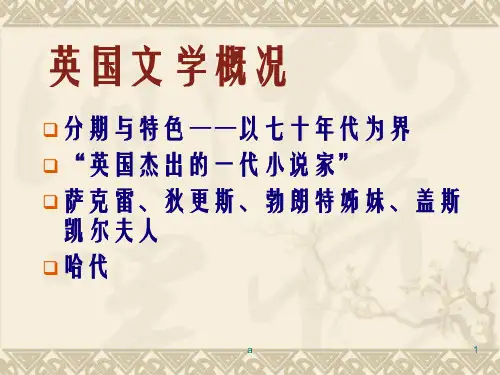


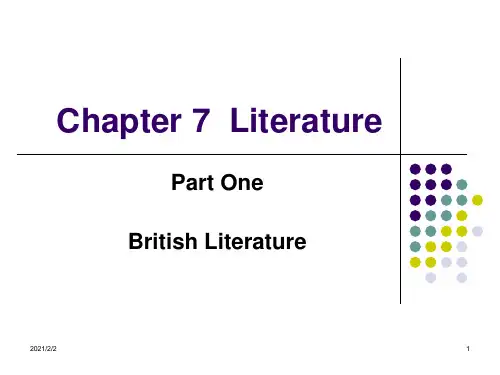

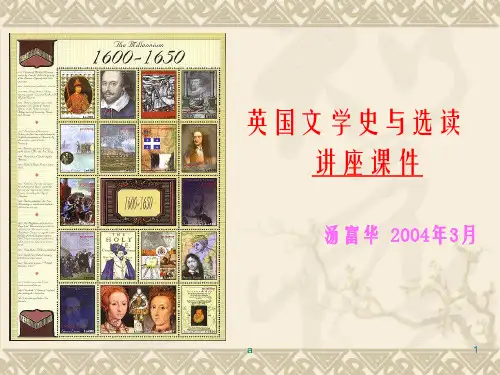
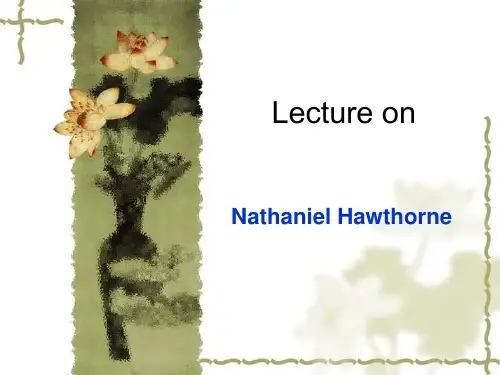


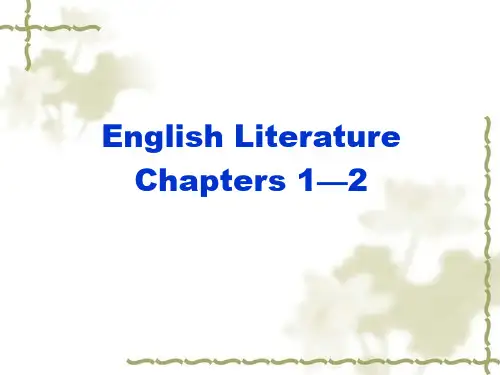
Brutus addresses the crowd, saying that while he loved Caesar, he loved Rome more. He asks them whether they would prefer it if Caesar were alive and they all slaves, or Caesar were dead and they were free? Brutus honors Caesar for his bravery but says he killed him because he was ambitious. Who wants to be a slave? he asks. Who does not love his country? He invites a response from the crowd, which cries out in support of him. Brutus concludes that he can have offended no one by his act. As Antony enters with Caesar's body, Brutus tells the crowd that he killed his best friend for the sake of Rome, and that he has the same dagger reserved for himself, when his country should need his death. He then leaves to the cheers of the crowd, insisting that everyone stay to hear Antony's speech. The crowd is convinced by Brutus's speech that Caesar was a tyrant. Antony addresses the crowd. He says he came to bury Caesar, not to praise him. Brutus has said that Caesar was ambitious, and if that was true, then it was a bad fault in Caesar, and he has fully paid for it. Antony points out that he speaks with the permission of the assassins, and he calls Brutus an honorable man, as are all they all. He says that Caesar was his friend and always behaved fairly to him. Then he repeats that Brutus said Caesar was ambitious, and Brutus is an honorable man. But then he begins to cast doubt on the case against Caesar. He points out that Caesar brought home many captives to Rome, whose ransoms increased Rome's revenues. Was that ambitious? When the poor suffered, Caesar pitied and wept with them. Did that seem ambitious? He repeats for a third time that that Brutus said Caesar was ambitious, and that Brutus is an honorable man. Next, he reminds the crowd that three times he tried to present Caesar with a crown, and each time Caesar rejected it. Was that ambitious? Once more Antony repeats the reference to Brutus and the fact that he is honorable. He claims that he is not there to disprove what Brutus has said, only to speak what he knows. He asks the crowd that since they all loved Caesar once, why can they not mourn for him? For a moment he is overcome by tears and has to pause. Antony's speech is beginning to have its effect. Convinced by the points he has made, the crowd is ready to change sides and denounce Brutus. Continuing, Antony claims it is not his intention to stir up rage against Cassius and Brutus (who are honorable men). Then he produces Caesar's will. If the people could hear it, he says, even though he does not intend to read it, they would kiss Caesar's wounds, by which he means that they would be extremely grateful to him. The crowd clamors to hear the will, but Antony says it is not good for them to know how much Caesar loved them; it will only inflame them and make them angry. The crowd continues to call for the will. Persuaded by the clamor, tells them to form a circle around Caesar's corpse. Antony points to each of the many wounds in Caesar's mantle, describing which was made by which conspirator. He makes particular play with the wound caused by Brutus, whom Caesar loved. When Caesar saw Brutus stab him, he was overcome by Brutus' ingratitude far more than any physical wounds. For the first time, Antony refers to the assassination as treason. Then he pulls back the mantle and shows Caesar's body. The crowd is shocked and calls for revenge. Antony asks them to restrain themselves, although as he explains himself, referring again to the "honorable" men who killed Caesar, and saying that he has no gift of oratory, unlike Brutus, to stir men to action. But if he were Brutus, and Brutus Antony, then he would speak with passion and call for mutiny in Rome. The crowd is about to scatter and stir up a rebellion when Antony reminds them that they have not heard the will yet. Antony announces that Caesar gives to every Roman citizen the sum of seventy-five drachmaes. He has also left his forest and orchards to be public pleasure-grounds, where anyone can walk. The common people rush off, vowing to burn down the assassins' houses. Antony is satisfied at what his words have achieved and waits for whatever events unfold. A servant enters and tells Antony that Octavius, and Lepidus have arrived. He also says that Brutus and Cassius have fled Rome. Antony assumes it is because they heard of how he had stirred the people up against them. Brutus makes an effective speech that appeals to reason. But he is far surpassed by the brilliant cunning of Antony, who plays directly on the emotions of the crowd. Through the use of irony, he not only manages to suggest that Brutus and his fellow conspirators are not honorable men, he does so without violating the conditions imposed on him: that he not speak ill of the assassins. Not only are Antony's words devastating in the way they undermine Brutus's speech, he is also a master actor. The pause for tears, for example, whether sincere or not, is dramatically effective, and Antony's use of his props, the dead body-who could not be moved by the sight of Caesar's bloody corpse?-and the will, are also superb in their timing and effect. It is clear that Brutus has made a series of miscalculations. His biggest mistake is to allow Antony to speak at the funeral. He then compounds the error by leaving the scene after his own speech, which effectively gives Antony the last word. It seems that Brutus is so concerned with acting nobly (or perhaps trying to convince everyone, including himself, that he is doing so), that he makes the kind of blunders that Cassius, moreruthless and with a fiercer hunger for power, would never have made if left to himself. In the game of power politics, ruthlessness pays bigger dividends than nobility.The action begins in February 44 BC. Julius Caesar has just reentered Rome in triumph after a victory in Spain over the sons of his old enemy, Pompey the Great. A spontaneous celebration has interrupted and been broken up by Flavius and Marullus, two political enemies of Caesar. It soon becomes apparent from their words that powerful and secret forces are working againstCaesar appears, attended by a train of friends and supporters, and is warned by a soothsayer to “beware the ides of March,” but he ignores the warning and leaves for the games and races marking the celebration of the feast of Lupercal. After Caesar’s departure, only two men remain behind—Marcus Brutus, a close personal friend of Caesar, and Cassius, a long time political foe of Caesar’s. Both men are of aristocratic origin and see the end of their ancient privilege in Caesar’s po litical reform s and conquests. Envious of Caesar’s power and prestige, Cassius cleverly probes to discover where Brutus’ deepest sympathies lie. As a man of highest personal integrity, Brutus opposes Caesar on principle, despite his friendship with him. Cassius cautious ly inquires about Brutus’ feelings if a conspiracy were to unseat Caesar; he finds Brutus not altogether against the notion; that is, Brutus shares “some aim” with Cassius but does not wish “to be any further moved.” The two men part, promising to meet again for further discussions.In the next scene, it is revealed that the conspiracy Cassius spoke of in veiled terms is already a reality. He has gathered together a group of disgruntled and discredited aristocrats who are only too willing to assassinate Caesar. Partly to gain the support of the respectable element of Roman society, Cassius persuades Brutus to head the conspiracy, and Brutus agrees to do so. Shortly afterward, plans are made at a secret meeting in Brutus’ orchard. The date is set: It will be on the day known as the ides of March, the fifteenth day of the month. Caesar is to be murdered in the Senate chambers by the concealed daggers and swords of the assembled conspirators. After the meeting is ended, Brutus’ wife, Portia, suspecting something and fearing for her husband’s safety, questions him. Touched by her love and devotion, Brutus promises to reveal his secret to her later.The next scene takes place in Caesar’s house. The time is the early morning; the date, the fateful ides of March. The preceding night has been a strange one—wild, stormy, and full of strange and unexplainable sights and happenings throughout the city of Rome. Caesar’s wife, Calphurnia, terrified by horrible nightmares, persuades Caesar not to go to the Capitol, convinced that her dreams are portents of disaster. By prearrangement, Brutus and the other conspirators arrive to accompany Caesar, hoping to fend off any possible warnings until they have him totally in their power at the Senate. Unaware that he is surrounded by assassins and shrugging off Calphurnia’s exhortations, Caesar goes with them.Despite the conspirators’ best efforts, a warning is pressed into Caesar’s hand on the very steps of the Capitol, but he refuses to read it. Wasting no further time, the conspirators move into action. Purposely asking Caesar for a favor they know he will refuse, they move closer, as if begging a favor, and then, reaching for their hidden weapons, they kill him before the shocked eyes of the senators and spectators.Hearing of Caesar’s murder, Mark Antony, Caesar’s closest friend, begs permission to speak at Caesar’s funeral. Brutus grants this permission over the objections of Cassius and delivers his own speech first, confident that his words will convince the populace of the necessity for Caesar’s death. After Brutus leaves, Antony begins to speak. The crowd has been swayed by Brutus’ words, and it is an unsympathetic crowd that Antony addresses. Using every oratorical device known, however, Antony turns the audience into a howling mo b, screaming for the blood of Caesar’s murderers. Alarmed by the furor caused by Antony’s speech, the conspirators and their supporters are forced to flee from Rome and finally, from Italy. At this point, Antony, together with Caesar’s young grandnephew an d adopted son, Octavius, and a wealthy banker, Lepidus, gathers an army to pursue and destroy Caesar’s killers. These three men, known as triumvirs,have formed a group called the Second Triumvirate to pursue the common goal of gaining control of the Roman Empire.Months pass, during which the conspirators and their armies are pursued relentlessly into the far reaches of Asia Minor. When finally they decide to stop at the town of Sardis, Cassius and Brutus quarrel bitterly over finances. Their differences are resolved, however, and plans are made to meet the forces of Antony, Octavius, and Lepidus in one final battle. Against his own better judgment, Cassius allows Brutus to overrule him: Instead of holding to their well-prepared defensive positions, Brutus o rders an attack on Antony’s camp on the plains of Philippi. Just before the battle, Brutus is visited by the ghost of Caesar. “I shall see thee at Philippi,” the spirit warns him, but Brutus’ courage is unshaken and he goes on.The battle rages hotly. At fi rst, the conspirators appear to have the advantage,but in the confusion, Cassius is mistakenly convinced that all is lost, and he kills himself. Leaderless, his forces are quickly defeated, and Brutus finds himself fighting a hopeless battle. Unable to face the prospect of humiliation and shame as a captive (who would be chained to the wheels of Antony’s chariot and dragged through the streets of Rome), he too takes his own life.As the play ends, Antony delivers a eulogy over Brutus’ body, calling him “the noblest Roman of them all.” Caesar’s murder has been avenged, order has been restored, and, most important, the Roman Empire has been preserved.Act Three, Scene TwoBrutus and Cassius tell the plebeians to follow them in order to hear an explanation for the murder. They split the multitude into two parties and Cassius leaves to speak to one group while Brutus speaks to the other. Brutus tells the masses that he loved Caesar more than any of them, but that he killed Caesar because he loved Rome more. He says, "As Caesar loved me, I weep for him. As he was fortunate, I rejoice at it. As he was valiant, I honor him. But as he was ambitious, I slew him" ( Brutus then asks them if they wish him to die for his actions, to which the crowd replies, "Live, Brutus, live, live!" ( Lastly, he begs them listen to Mark Antony and to let him depart alone. Thus, he leaves Mark Antony alone to give his oration.Antony's speech begins with the famous lines, "Friends, Romans, countrymen, lend me your ears" ( His speech continually praises Brutus as "an honourable man" who has killed Caesar for being ambitious yet also describes Caesar as the most honorable and generous of men. In this way, Antony appears to praise his friend while respecting the men who murdered him, when in fact, Antony is inciting hte crowd against Brutus, Cassius and the conspirators.The plebeians are easily swayed and conclude that Caesar was not ambitious, and was wrongly murdered. Next, after the plebeians beg, Antony reads Caesar's will after descending into the masses and standing next to Caesar's body. He shows them the stab wounds and names the conspirators who gave Caesar the wounds. The crowd starts to surge away in anarchy, crying, "Revenge! About! Seek! Burn! Fire! Kill! Slay!" ( Antony stops them and finally reads the will, in which Caesar has given every Roman citizen seventy-five drachmas and the freedom to roam his land. The plebeians react in a frenzy of anger against the men who killed Caesar, and carry away the body. Antony says, "Now let it work. Mischief, thou art afoot. / Take thou what course thou wilt" ( The servant of Octavius arrives and tells Antony that Octavius is already in Rome and is waiting for him at Caesar's house. Brutus Marcus Junius Brutus, Roman senator and mastermind of the plot to assassinate Julius Caesar, is the central character of the play. Brutus is first seen in 1.2., discussing with Cassius why the republic would be best served with Caesar's removal. After the conspirators carry out the crime, Brutus gives a moving speech to convince the Plebeians that it was necessary to kill Caesar, but Antony arrives and turns the crowd against him. Brutus flees Rome and tries to regain the capitol by forming an army, but Antony’s forces are too skilled and strong to combat. Wh en he realizes the cause is lost, Brutus convinces his servant, Strato, to hold his sword while he falls upon it, and he dies. Antony and Octavius find his body and Antony, knowing Brutus was pure in his motive to help the republic, declares Brutus "was the noblest Roman of them all." Shakespeare’s Brutus is very similar to the historical Brutus, as described in Plutarch’s Lives. His qualities in both are best summarized by Victorian critic M. Guizot:Marc Antony Antony, the heroic leader of the forces that defeat Brutus and the other conspirators, is also the title character in another Shakespearean tragedy, Antony and Cleopatra. In Julius Caesar, Antony is introduced in 1.2 and his importance is indicated by Cassius’s proposal that he be assassinated along with Caesar (2.1). Antony delivers his most significant speech (in either tragedy) in 3.2: "Friends, Romans, countrymen, lend me your ears…" (79). After Brutus commits suicide, Antony eulogizes Brutus in a speech that begins with one of Shakespeare's best known lines: "This was the noblest Roman of them all" (Antony’s speech serves to restore Brutus to the position of tragic hero. Antony can see in Brutus the morality he does not himself possess - the capability to act selflessly for the common good. Brutus's pride and political naivety have led to his destruction, but his ideals are etched into the memory of his enemies.。